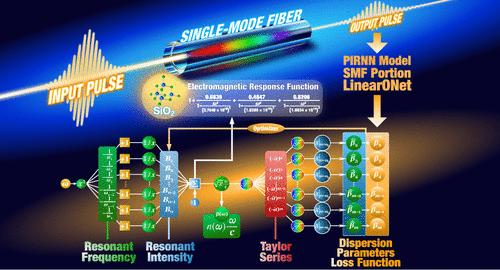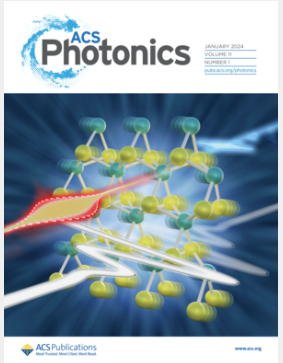Reversely Exploring Higher-Order Effects in a Fiber Laser through Physics-Informed Recursive Neural Network
IF 6.5
1区 物理与天体物理
Q1 MATERIALS SCIENCE, MULTIDISCIPLINARY
引用次数: 0
Abstract
In ultrafast fiber lasers, the influence of higher-order effects on mode-locked pulses becomes increasingly notable as the pulse width decreases from the subpicosecond to the femtosecond level. However, accurately predicting the underlying higher-order effects in nonlinear nonconservative systems remains difficult with forward-calculating nonlinear partial differential equations. We propose a novel physics-informed recursive neural network (PIRNN) model to reversely explore the underlying higher-order effects in fiber lasers. Based on experimental data, the PIRNN can reversely deduce the coefficients of the group velocity dispersion, third- and fourth-order dispersion effects, and the third- and fifth-order nonlinearities in fibers to establish higher-order nonlinear Schrödinger equations and Ginzburg–Landau equations, which govern the theoretical model of a fiber laser. The PIRNN further demonstrates which higher-order effects are dynamically stimulated for different cases of 879 fs and 1.62 ps solitons in the experiments. Furthermore, the PIRNN-predicted spectrotemporal and phase information is verified by both experimental results and forward-calculating results of the theoretical model. Additionally, the physical rule of electromagnetic resonant radiation of bound electrons in SiO2-based fibers is reversely deduced by constructing our self-designed dielectric neural network. Our novel approach for reversely exploring underlying higher-order effects introduces a novel perspective for investigating nonconservative systems.

通过物理信息递归神经网络反向探索光纤激光器中的高阶效应
在超快光纤激光器中,随着脉冲宽度从亚皮秒级减小到飞秒级,高阶效应对锁相脉冲的影响越来越显著。然而,要准确预测非线性非守恒系统中的潜在高阶效应,仍很难通过前向计算非线性偏微分方程来实现。我们提出了一种新颖的物理信息递归神经网络(PIRNN)模型,用于反向探索光纤激光器中的潜在高阶效应。基于实验数据,PIRNN 可以反向推导出光纤中的群速度色散系数、三阶和四阶色散效应以及三阶和五阶非线性,从而建立高阶非线性薛定谔方程和金兹堡-朗道方程,这些方程制约着光纤激光器的理论模型。PIRNN 进一步证明了在实验中 879 fs 和 1.62 ps 孤子的不同情况下,哪些高阶效应会被动态激发。此外,实验结果和理论模型的前向计算结果都验证了 PIRNN 预测的谱时和相位信息。此外,通过构建我们自行设计的介电神经网络,还反向推导出了束缚电子在二氧化硅基光纤中电磁共振辐射的物理规律。我们反向探索底层高阶效应的新方法为研究非守恒系统引入了一个新的视角。
本文章由计算机程序翻译,如有差异,请以英文原文为准。
求助全文
约1分钟内获得全文
求助全文
来源期刊

ACS Photonics
NANOSCIENCE & NANOTECHNOLOGY-MATERIALS SCIENCE, MULTIDISCIPLINARY
CiteScore
11.90
自引率
5.70%
发文量
438
审稿时长
2.3 months
期刊介绍:
Published as soon as accepted and summarized in monthly issues, ACS Photonics will publish Research Articles, Letters, Perspectives, and Reviews, to encompass the full scope of published research in this field.
 求助内容:
求助内容: 应助结果提醒方式:
应助结果提醒方式:


